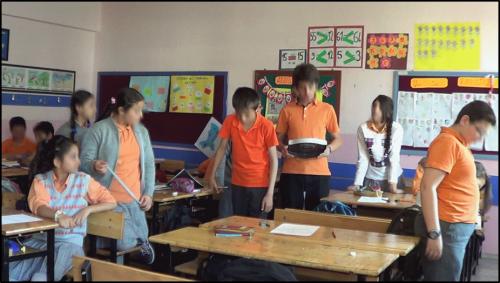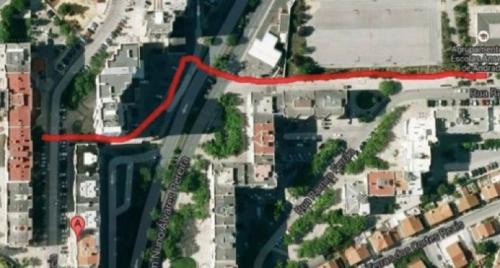In the Speed SAILS inquiry and assessment unit, two activities are presented for introducing the concept of velocity. Kinematics is a topic found on both lower and upper level science curricula across Europe, and forms the basis for many advanced topics in physics. Velocity, and the term speed, are found in everyday life in relation to journeys and are of clear relevance to students. This unit is concerned with the physical concepts of distance, time, the absolute value of velocity and its distinction from the concept of speed. The concept acceleration can also be included. The activities are presented as a bounded inquiry and each activity is expected to take one 45-minute lesson.
This unit can be used for development of many inquiry skills, such as planning investigations developing hypotheses, forming coherent arguments and working collaboratively. In addition, students develop their scientific reasoning and scientific literacy. Assessment opportunities include teacher observation and classroom dialogue, evaluation of student artefacts and self-assessment.
This unit was trialled in four countries – Turkey, Ireland, Portugal and Germany – producing four case studies (students aged 12-18; mixed ability and gender). The teaching approach was bounded inquiry in all cases. Planning investigations was assessed in all case studies, while skill in forming coherent arguments and working collaboratively were assessed in some case studies, along with scientific reasoning and literacy. Assessment was primarily formative and achieved through classroom dialogue, teacher observation and evaluation of student artefacts.
- Velocity, speed
- Measurement (accuracy of measurements)
- Lower
- Upper
- Planning investigations
- Forming coherent arguments
- Working collaboratively
- Scientific reasoning
- Classroom dialogue
- Teacher observation
- Peer-assessment
- Student devised materials
The Speed SAILS inquiry and assessment unit was developed by the team at King’s College London as part of the SAILS project. This unit is committed to an inquiry based learning approach with regard to the physical concepts distance and time, the absolute value of velocity and its distinction from the concept speed. Two activities are proposed; in the first students are asked to consider “how fast can you go?” and investigate the variables of time and distance. In the second activity, students consider the everyday example of their journey from home to school, and identify the distance, time and speeds involved in this journey. Several inquiry skills play a central role in the activities of this unit. The most important skill is planning investigations, as well as further skills like setting up the investigation/experiment, scientific reasoning (identifying variables, controlling variables), carrying out the investigation and collecting data or analysis of results.
The Speed SAILS inquiry and assessment unit mainly addresses the inquiry skills planning investigations (including collection and interpretation of data and identifying variables) and working collaboratively. These skills could be seen as the points to be emphasised in the formative feedback to students as they work on the inquiry: such feedback can arise in oral discussion as students are doing the tasks, and as feedback on written reports if students are asked to produce written accounts of their work.
Student artefacts could include a report at the end by each individual, or in the form of an "activity diary" which would include, for example, reports of interim plans and ideas. For example, interim reports, such as those produced in Activity A, might form part of such a diary. Another part of the diary could be written at the end, by asking each student to describe what they had learnt from the experience, thus encouraging reflection and self-assessment. The various possibilities should be foreseen in planning the activity, as opportunities for both formative and summative assessment of the evidence of each student's learning.
The Speed SAILS inquiry and assessment unit was originally developed to consist of eight activities (activities A-H), however only activities A and B were implemented in the case studies, as these are most suited for beginning any inquiry about speed. However, in activities C-H, further investigations are described. They can be used directly after activities A and B or independently in the case of an advanced physics class.
Below you can find the full inquiry and assessment unit for download, as well as an archive with classroom materials, including student worksheets and assessment tools for teachers to be used during the activities if available.
Unit booklet Classroom materials| Concept focus |
Introduction to concept of speed
|
| Inquiry skills focus |
Planning investigations
Developing hypotheses
Working collaboratively
|
| Scientific reasoning |
Identifying variables
Forming conclusions
|
| Assessment methods |
Classroom dialogue
Student devised materials
|
| Concept focus |
Relationship between distance, time and speed
|
| Inquiry skills focus |
Planning investigations
Forming coherent arguments
|
| Scientific reasoning |
Graphical representation of data
|
| Scientific literacy |
Interpretation of scientific data
|
| Assessment methods |
Classroom dialogue
Student devised materials
|
This unit was trialled in four countries, producing four case studies of its implementation – CS1 Turkey, CS2 Ireland, CS3 Portugal and CS4 Germany. All the case studies were implemented by teachers who had some experience of teaching through inquiry, but the students involved had limited experience of inquiry learning (except for CS3 Portugal).
CS1 Turkey, CS2 Ireland and CS4 Germany involved lower second level students: CS1 Turkey was a class of 24 students working in groups of four, CS2 Ireland was a class of 24 students, who worked individually and then in pairs and CS4 Germany involved a mixed gender class of 30 students working in groups of three or four. CS1 Turkey, CS2 Ireland and CS4 Germany describe single lessons of 45 minutes, 80 minutes and 120 minutes duration, respectively. The students in CS3 Portugal were a class of 16 mixed ability and mixed gender upper second level students aged 15-18 years old, working in groups of two or three, and the case study describes two consecutive lessons for a total of 225 minutes.
The key skill identified for assessment in all case studies was planning investigations, including implementation of the planned experiments and scientific reasoning associated with planning. This was achieved through classroom dialogue and teacher observation, as well as evaluation of student artefacts.
The inquiry approach used in all the case studies was that of bounded inquiry, i.e. it was guided in the sense that the teacher posed the initial question but there were open inquiry opportunities in that students had freedom in addressing the question. Students completed the activities working individually or in small groups and peer discussion was encouraged and facilitated.
Within the four case studies, the inquiry skill of planning investigations was the primary skill assessed. Each case study considered both planning and implementation as part of this skill. In addition, forming coherent arguments, developing hypotheses and working collaboratively were assessed in different ways, with some teachers using the proposed rubrics. Additionally the content knowledge and evidence of scientific reasoning/literacy was assessed through the student worksheets and verbal responses.
Below you can find the full inquiry and assessment unit for download (excluding the case studies), as well as an archive containing all the case studies.
Unit booklet Case studies| Concept focus |
Introduction to the concept of speed
|
| Activities implemented |
How fast can you go?
|
| Inquiry skills assessed |
Planning investigations
Working collaboratively
|
| Scientific reasoning |
Collection of data
Identification of variables
|
| Assessment methods |
Classroom dialogue
Teacher observation
Worksheets
|
| Level |
Lower
|
| Age |
14-15
|
| Prior experience with inquiry |
Some experience
|
| Concept focus |
Introduction to the concept of speed
|
| Activities implemented |
How fast can you go?
|
| Inquiry skills assessed |
Planning investigations
Developing hypotheses
|
| Scientific reasoning |
Identification of variables
|
| Assessment methods |
Classroom dialogue
Teacher observation
Worksheets
|
| Level |
Lower
|
| Age |
13
|
| Prior experience with inquiry |
Some experience
|
| Concept focus |
Introduction to the concept of speed
|
| Activities implemented |
Getting to school
|
| Inquiry skills assessed |
Planning investigations
|
| Scientific reasoning |
Identification of variables
|
| Assessment methods |
Classroom dialogue
Student devised materials
|
| Level |
Upper
|
| Age |
15-18
|
| Prior experience with inquiry |
Some experience
|
| Concept focus |
Introduction to the concept of speed
|
| Activities implemented |
How fast can you go?
|
| Inquiry skills assessed |
Planning investigations
|
| Scientific reasoning |
Identification of variables
|
| Assessment methods |
Classroom dialogue
Teacher observation
Student devised materials
|
| Level |
Lower
|
| Age |
12-13
|
| Prior experience with inquiry |
Some experience
|




